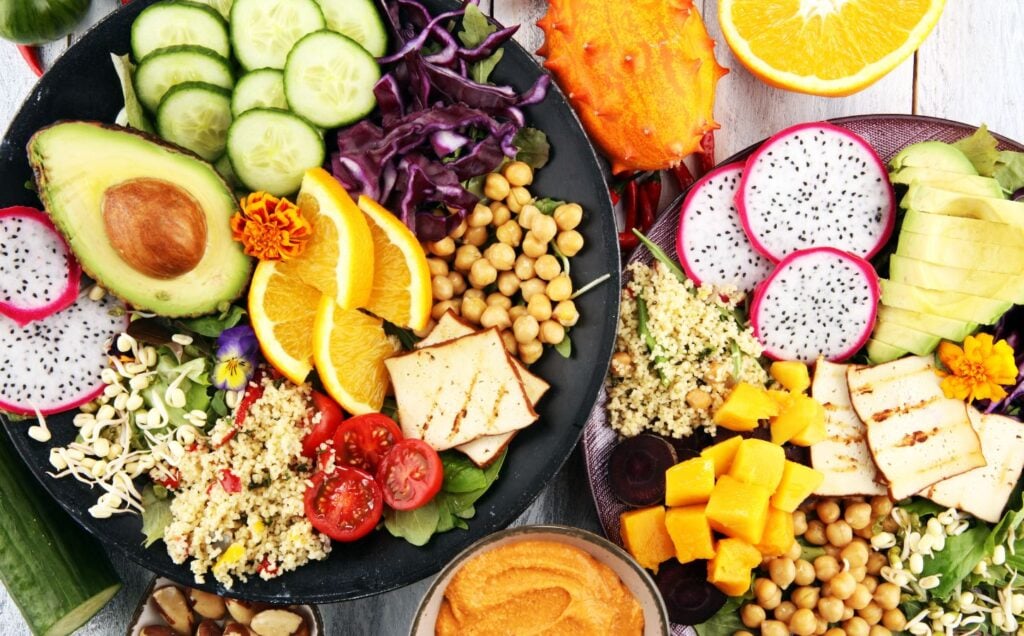Experts advise that a vegan diet can be nutritionally adequate and help to prevent chronic diseases. However, a plant-based diet should be planned appropriately to gain the health benefits and avoid nutrient deficiencies.
Veganism is more popular than ever before, with a record-breaking 700,000 people signing up for Veganuary globally in 2023. Major business brands are on board, with this year seeing a 75 percent increase in US corporate Veganuary participation.
Health isn’t everyone’s motivation for becoming vegan. But it’s essential to understand if plant-based eating provides the nutrients humans need to thrive.
Here are the potential health benefits of following a vegan diet – based on what the research says. Also discussed below are the risks of not planning a diet properly and what nutrients to consider.
What are the potential health benefits of being vegan?
The Academy of Nutrition and Dietetics advises that appropriately planned vegan diets are healthful, nutritionally adequate, and may provide health benefits for preventing and treating certain diseases.
Additionally, they confirm that plant-based diets are appropriate for all life cycle stages, and athletes. Furthermore, the academy points out that vegans have a lower risk of certain health conditions and chronic diseases.
The following sections look more closely at the health benefits of a vegan diet.
May protect against heart disease
It’s becoming increasingly apparent that a plant-based diet has multiple benefits in preventing chronic diseases such as heart disease.
A 2022 review suggests that a vegan diet reduces cardiometabolic risk factors such as body weight, waist circumference, and LDL cholesterol.

Another 2022 systematic review and meta-analysis suggested that vegan diets may reduce the risk of ischemic heart disease by 18 percent compared to an omnivore diet. The reviewers noted that lower body weight and higher consumption of whole foods, along with avoiding red meat, have positive benefits on heart health. They concluded that the findings support a stronger emphasis on plant-based diets in public health recommendations as a preventative measure for cardiovascular disease.
Older Adventist studies in 2014 indicate that while vegetarian diets show a lower risk for cardiometabolic diseases and some cancers, vegan diets offer additional protection against the following outcomes:
- obesity
- cardiovascular mortality
- type 2 diabetes
- hypertension
According to the review, vegans have lower body mass index (BMI) and cholesterol levels than vegetarians, which may account for the additional health benefits.
Could help people with diabetes
A 2022 review found that a vegan diet was especially effective for diabetes patients. The researchers indicated that vegan diets reduce the following markers, which can be helpful in managing and preventing diabetes:
- body weight
- waist circumference
- LDL-cholesterol
- fasting glucose
- HbA1c
Research from 2021 concludes that vegans may have a protective advantage against type 2 diabetes (T2D) due to their lower BMI and their nutrient intake profile. The Rotterdam study in 2018 backed this up, concluding that a more plant-based and less animal-based diet may lower the risk of insulin resistance, prediabetes, and T2D.
Improves gut bacteria and colon health
Gut bacteria, which scientists refer to as the microbiome, is a huge area of interest for researchers due to how it influences health and disease.
Research indicates that microbial communities in the gut and saliva differ between plant-based and omnivorous diets. Plant foods contain fiber which acts as a “prebiotic” to feed beneficial bacteria, and this may help to increase bacterial diversity.
Although scientists need to do more studies, it seems that Prevotella bacterial abundance in vegans may be beneficial for regulating blood sugar and weight.
In addition, studies suggest vegans have a lower abundance of potentially harmful protein fermentation products in their gut than omnivores. This may be due to vegans eating more fiber and less protein than a standard omnivore diet.

Scientists are still trying to understand the impact of high-protein diets and protein fermentation on health. However, studies reveal that abundant protein fermentation inflames the cells lining the colon and increases the risk of colorectal cancer. Meanwhile, increased fiber fermentation protects against this.
Gut bacteria also influence cognitive and mental health via the microbiome−gut−brain axis. Put simply, beneficial bacteria in the gut can have a positive impact on the brain. However, the evidence for the effects of strictly plant-based diets on cognition is limited.
Anti-inflammatory and antioxidant
Healthy vegan diets are abundant in fruits and vegetables, which contain beneficial phytochemicals and antioxidants. These plant compounds fight free radicals, which cause damage to the body and help to prevent inflammation.
While inflammation can be a beneficial immune response, chronic low-grade inflammation is a fundamental part of many health issues and diseases.
Research indicates that plant foods can prevent the formation of reactive oxygen species and oxidized low-density lipoprotein (LDL) cholesterol – major contributors to heart disease. Another study suggests a whole food plant-based diet may prevent cellular damage and skin aging.
Additionally, eating more plant compounds, such as flavonoids and anthocyanins is associated with a reduced rate of cognitive decline due to their beneficial effect on inflammatory processes.
Furthermore, a study suggested that plant-based diets avoid substances that negatively affect our metabolic status and overall health. For example, animal products such as dairy, meat, and eggs can contain nitrosamines, antibiotics, and dioxins that can cause oxidative stress and inflammation.
Helps to manage weight
According to a 2019 systematic review, there is robust evidence that plant-based diets are more beneficial than conventional diets for weight loss.
Interestingly, this is not due to fewer calories, as some people might assume. Instead, the review suggests that multiple mechanisms may help weight loss, including better blood sugar control, lower inflammation, and altered intestinal activity.
Additionally, a 2022 umbrella review of nearly 400 studies found that people on a plant-based diet have a lower body mass index (BMI). The researchers concluded that a vegan diet is effective in the reduction of body weight compared to control diets. This was true for both healthy, diabetes, and at-risk populations.
Health risks of going vegan
The main potential risk of a vegan diet is due to not planning it properly. Vegans must be aware of what nutrients they need to avoid ill health and optimize their wellbeing. While studies indicate that vegan diets are generally rich in vitamins C, E, folic acid, and magnesium, other nutrients can be too low.
For example, research indicates that vegans may have a higher fracture rate due to lower calcium intake. Furthermore, some vegans are deficient in vitamin B12, increasing the risk of cardiovascular disease and neurological disorders.
Avoiding nutrient deficiency
The British Dietetic Society advises that well-planned plant-based diets can support healthy living at every age and life stage. However, they suggest that there are specific nutrients that vegans must be aware of consuming in sufficient amounts. These include:
- vitamin B12
- calcium
- omega-3 fatty acids
- iodine
- protein
- vitamin D
- zinc
- iron
- selenium
People can achieve their recommended intake of some of these nutrients through whole foods and fortified foods.
However, experts advise that vegans can take a supplement to meet daily amounts of vitamin B12, vitamin D, and omega-3 fatty acids. In addition, some manufacturers design multi-nutrient products for vegans to ensure they get the correct dosages.

Vegans who are pregnant or breastfeeding should speak to their healthcare provider about taking supplements. If they are deficient in vitamin B12, they may not provide adequate amounts through their milk. They may also need an iron supplement as non-heme iron is less bioavailable than animal sources. They may need other nutrients such as omega-3 fatty acids, so they should always check with a doctor.
Ultra-processed foods
Another potential drawback to a vegan diet is the risk of eating too many processed foods. Most vegan junk food is ultra-processed, containing high levels of sugar, fat, or salt.
If someone doesn’t limit these foods, they could lead to ill health.
Foods such as fake meats often contain fillers and additives and are not nutrient-dense. Occasionally eating these foods may not cause a problem, but vegans shouldn’t rely on them for essential nutrients. Instead, mainly whole foods should be focused on for optimal health.
Summary
Evidence suggests multiple health benefits of a plant-based diet, including a lowered risk of heart disease and diabetes.
Vegans generally consume higher amounts of specific vitamins and minerals, but they need to know which nutrients could become deficient. An excellent starting point is to plan varied whole-food meals carefully.
Additionally, people can find information from a reputable source or consult a nutrition professional for advice.
Furthermore, supplementing a healthy diet with specific nutrients such as vitamin B12, vitamin D, and omega-3 fatty acids helps to ensure that vegans stay healthy and avoid deficiencies.
This article was first published on June 25, 2021. It was last updated on July 18, 2023.
—






